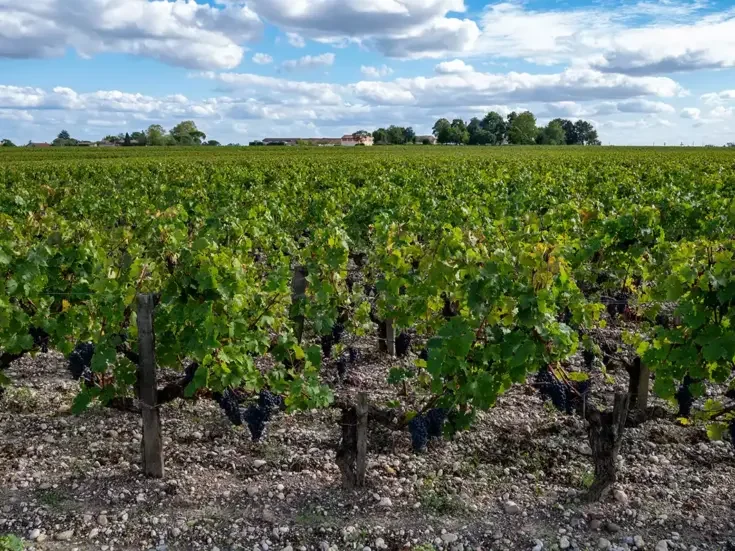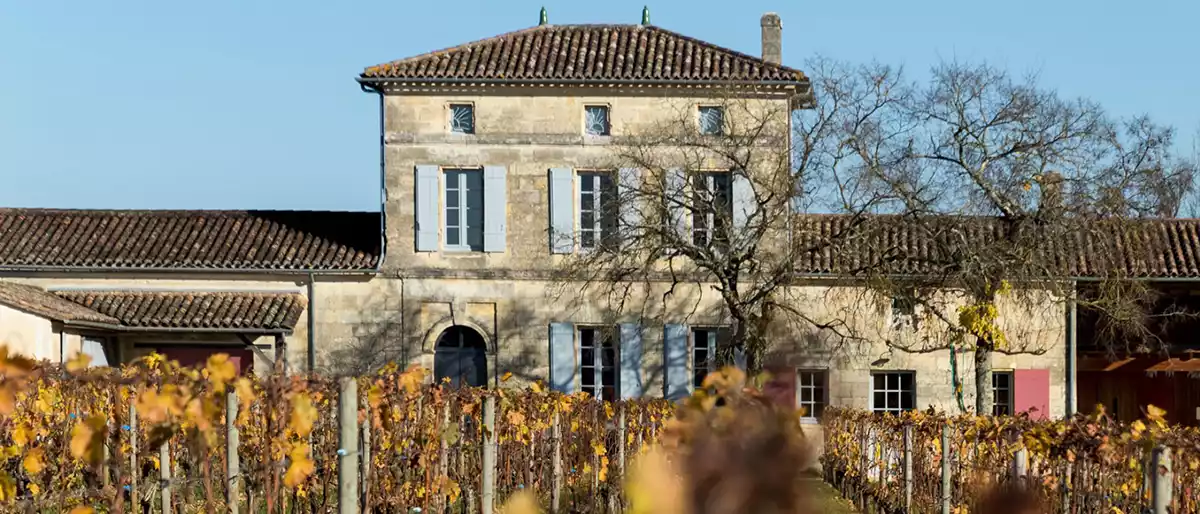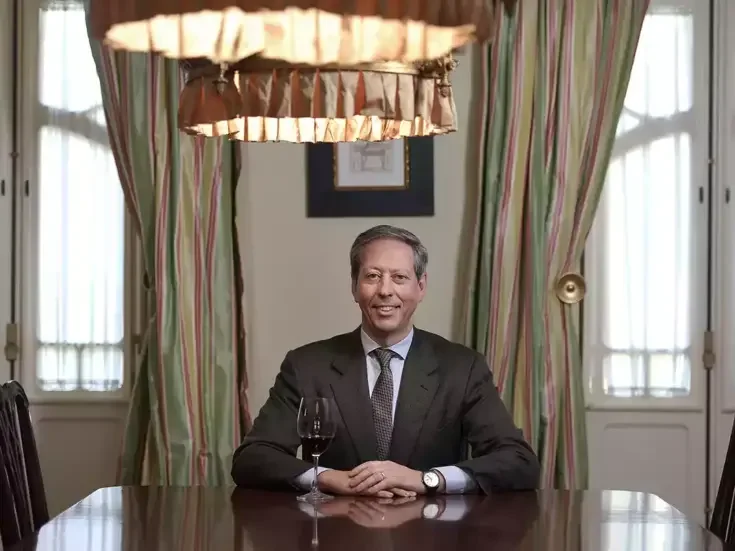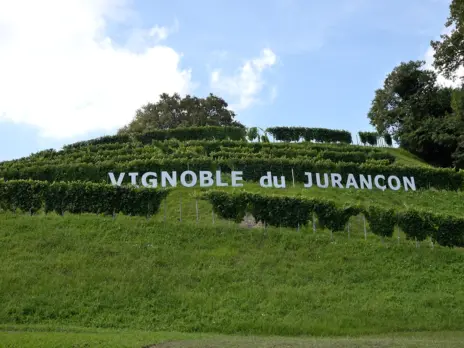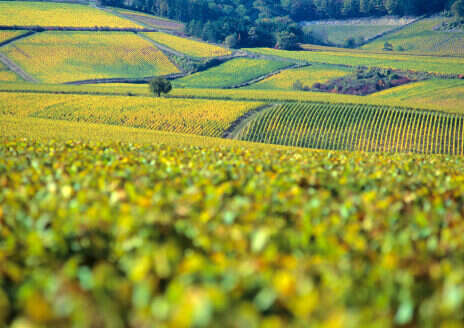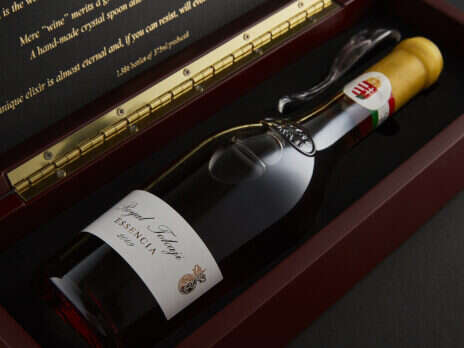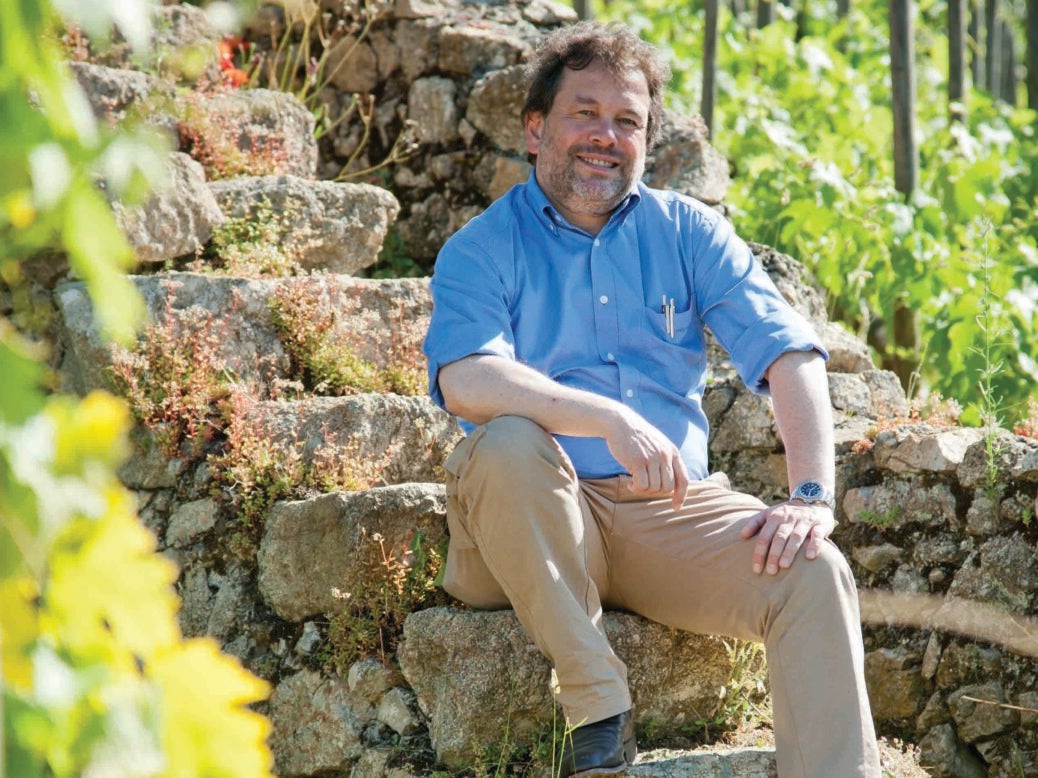
Margaret Rand tries to keep up with the master winemaker, delving into his past and looking to the future, with the next generation readying itself as he begins to step back
If I had to find one word to describe Michel Chapoutier, it might be “voracious.” His appetite for life and work is enormous: He devours ideas and vineyard land, art and books; it might even be that he’s devoured the odd person—though they were apparently happy with that. There can be something faintly disconcerting, even dangerous, about his very widest smiles. With someone who has achieved so much in so little time, it’s wise to stay on your toes.
When you walk into his offices in Tain l’Hermitage, the first thing that strikes you is his art collection. It’s varied, and it’s good. There is Inuit art there, aboriginal Australian, medieval European, Chinese, an Indonesian table—it shows an eclectic and educated eye. Chapoutier says he likes to bring back a piece of the history of the different places to which he exports. “Wine is a symbol of the connection of different nations. Give power to wineries, and you’ll have no more war.” He started buying when he first bought his family’s winery (of which more later), and he still buys regularly. The Ardèche can be a good source, apparently: “The wars of religion were very deep in parts of the Ardèche. There was a time when Protestants didn’t speak to Catholics—this was the case even in the vineyards, when I started; they didn’t speak. In the farms, people never sold their furniture because they were afraid the other side might buy it. You can still find good Chinese things there because they were traded along with silk.”
The winery was dying
The family winery was owned by Michel’s grandfather, among others, and his father worked in it. “I couldn’t work with my father. He had a different concept of quality in wine. I said to my grandfather that I didn’t want to stay. I had an opportunity to work elsewhere. My grandfather said, ‘Stay. Your father will leave; he’s tired.’ I said to my father, ‘The winery is dying.’
“I didn’t want to work hard and then have to buy the cost of my work from the shareholders. I wanted to buy it immediately at the cost of that day.” This was in 1990, and Michel was 25. “My father was tired. As in many family companies, his job had been obligatory. He wasn’t very happy to work for his father. My father was different: He would have preferred to be a philosopher, a writer; he was more intellectual than somebody who had to drive a company. He would have preferred more freedom to drive the company as he wanted; he had more fantasy. But my grandfather was very shut.
“If you come into a family company by duty, it’s difficult to be sharp in tasting and in demanding quality. I was a wine lover, not a Chapoutier-wine lover, and I didn’t like the style, the blending of vintages. The wine was too oxidized, and I didn’t recognize the style of tomorrow. Chapoutier was known, but it was losing market share, and the strength of the brand was finished.
“The signature of the appellation had to be stronger than the signature of the winemaker, after the war. In California, which was very advanced in winemaking, there was plenty of freedom, and you could have two domaines on the same soil, and the style could be different because the two winemakers had different styles. There was no room for terroir; they were winemaking wines. When I came back [from California; he was at Grace Family Vineyards in 1981 or 1982—this was before and while studying enology in Mâcon], I said, They are stronger than us in winemaking and in chemicals and modern identity, but they don’t have 20 centuries of vineyards, of roots in the same soil, of microbiology in the soil. I said, What is our strength? We have no sense of history, but we have 20 centuries of microbial life in the soil. We had to keep that alive, so I converted to biodynamism, and to single vineyards, and I saw that—”
Winemaker of the Year
Let’s pause there. Michel’s style is to devour entire decades without pausing for breath, and teasing out anything as prosaic as a sequence of events can be tricky. But I did warn you to stay on your toes.
Michel’s relationship with his father was not idyllic. Michel was one of five children, and all he will say on the record is that “this was before contraception, and so some [children] were wanted and some were not wanted.” He attributes his creativity in finding solutions to crises now to never having spent much time in school: “I used to be in the mountains, and I looked after the cows. It was boring, and it created my imagination. From [the age of] seven to 15, we had ten weeks’ holiday, and my parents sent me to a farm.” The two older children were taken on holiday in the summer; the younger ones not.
When he was 25, he solved his wine problem by buying the company and sacking his father. It doesn’t take much imagination to associate cause and effect, but Michel says no, “there was no passion in the replacement of my father [in the company]. He was just not the right person in the right place. He wanted out.”
It was not, however, an immediate happy ending. “Plenty of neighbors were nice to us in the 1990s because they were sure we’d go bankrupt, and they wanted to buy when we did.” Michel’s first wines were well received, and he wanted to ensure there was no confusion between old and new, so he persuaded his importers in the United States, UK, and Japan to destroy their old stocks, replace them with new, and pay themselves for the old, bit by bit, by taking a chunk out of every payment. This was fine, except that he owed money to the banks, who couldn’t understand why the business was ostensibly doing well but the profits weren’t there.
“I was Winemaker of the Year in Le Revue du Vin de France in 1992 and in the Olympiad of Syrah at Gault Millau in 1991, but the business was in big financial difficulties. I had 9,000 bottles of Pavillon, and if I’d combined them with the rest of the vineyard I could have paid all the salaries of the company. I said to this director, who was much older than me, that I would think about it. I didn’t sleep that weekend. If I do that [I thought], at the beginning of my dream, I start to lie to myself, and I will save the winery by a lie. So, I said to him, ‘I’m not interested if I have to save the company by a lie.’ During that week there were new orders, and they saved the company. It was like my angels sending me a challenge. That night and that weekend, I saved my company. It was not the end of my problems, but I felt stronger. I am convinced that if you are on a good way, your angels will help you.”
The question of intention
The mention of Pavillon takes us back to where we interrupted Michel’s account: single parcels, farmed biodynamically. This was his big plan when he started. (Pavillon is a parcel he’s isolated, but it’s not a lieu-dit, and there’s no official delimitation of it.) Chante Alouette was the first to go biodynamic, in 1991, and in 1992 and 1993 he extended biodynamism to everything.
“I love superstition,” he says, proving not for the first time that he is a master of the soundbite. “If you go back in the history of nations, all superstitions have strong common sense and reason [behind them]. It’s easier to explain biodynamics with the help of quantum mechanics. The intention is the thing… Deterministic science is not able to integrate the logic of quantum mechanics. We talk of having green fingers; plants will be happy with a particular person who has a good relation with plants; it’s a question of intention. I have a vineyard around my farm, 16 kilometers [10 miles] from here, and in 2013, there was high humidity that year, and in this vineyard— a friend is in charge of it, and it’s worked by people with disabilities like Down’s syndrome—there was no mildew. Elsewhere, with workers who come for work only and have no passion, even though there was less humidity there was more mildew pressure.
“Dynamizing gives the intention to water. Science versus homeopathy is like the Vatican versus Galileo.” (You have to switch the usual positions of science and faith at this point.) He relies on homeopathy to some extent himself; he is said always to travel with a homeopathic medical kit—though his parallel insistence that a car should be ready and waiting for him at all times when he travels means he’s unlikely to catch cold.
“In France, we have a handicap: All the philosophy of the 18th century proved that everything has to be rational. Our second handicap is to be against everything that is spiritual. If it’s spiritual, it’s against the state. If people are obsessed [with being] rational, there is no intention.”
This question of intention is crucial to his thinking. “If I had people who were simple-minded [working in my vineyards], I would never have any diseases. If you don’t take in the negatives, you can have a strong communication with the plant; amazingly stronger [communication] than a person embarrassed by his brain… Too many wineries have casual workers to do important things. We have to replace casual workers with permanent ones. Burgundy has understood this. The plants feel it. Diseases don’t attack the plant.”
People in the past knew how to cure themselves, he says, though he also accepts that they tended to die somewhat earlier. (If you query his more outré statements he might argue back, but more often he just veers off to something else.) He talks of reincarnation (“I believe totally in reincarnation,” though he doesn’t know what he was in previous lives), chemo and placebos and Chinese medicine—“it’s too late when you have cancer”—and mentions people he knows who’ve had lung cancer stabilized for 20 years with alternative medicine. “But I’m not comfortable to answer all this. I’m not a doctor.” He once held a weekend event at the winery dedicated to the memory of water.
His reading, judging from the books in his offices, is wine and food, the science of wine, geology, natural science, but also, he says, Helena Blavatsky, who invented theosophy, Steiner, Kalil Gibran, Wittgenstein. “My biggest influences are spiritual, and when you read different religions you’re not obliged to be adopted by a specific religion… It’s important to have an open spiritual mind. In quantum mechanics, there is a touch of spirituality. But the French only know the right brain.”
Choppers and carpentry
We ought to be a bit more French, however, and get back to the practicalities of running Chapoutier. From 1990 to 2000, Michel worked with his brother in the company but eventually bought him out. “He was happy to go. In 2000, it was not certain that the company would succeed.”
It was not until 2005, in fact, that Michel felt safe. “When you don’t have to ask the bank but the bank asks you, you’re secure.” And since then he’s been buying more than just art. He learned to fly helicopters in Montelimar, and then in 2015 he bought the school. “It was a good team, and I wanted it to be successful.” He’s now created his own helicopter: a small two-person helicopter that sells for around €150,000–160,000 and is easier and greener. He plans to use them for tourism, and he’s got orders for three years of production. He’s got a timber company that makes wooden cases for wine, as well as doors and furniture. He bought Ferraton when M Ferraton “got tired and wanted to sell. He’s a friend, and I said I would help and take it over and keep the name.” Usefully, it has 4ha (10 acres) on the Hermitage hill. He would like plenty more vineyards, too: 1,000ha (2,500 acres) of Côtes du Rhône and 100ha (250 acres) of crus would be nice, he thinks. He has, of course, numerous joint ventures elsewhere in France and abroad: Alsace, Champagne, Roussillon, Australia, Portugal, Oregon. He’s bought the hotel in Tain and plans to expand it. And he wants to buy some horses of the Cheval du Vercors de Barraquand breed, to use for rides up the hill. “But I’ll have to sell the idea to my daughter first.”
Mathilde is now group commercial director, and he speaks of her with healthy respect. “She’s tough. She’s several times French rifle-shooting champion, and she did studies in Mandarin. She’s very rational—she takes after her mother. She’s amazingly mature for her age… My son Maxim is more flexible than my daughter. She is flexible with everyone except me. She’s not scared of me.”
The next generation
Michel plans to take more of a backseat now and concentrate on altruistic ventures and research and development. “These are difficult years in the wine industry. There is a lack of vocation, and children are not interested in taking on [their parents’] vineyards. A company is a moral person. But a person is a person only if a person has a soul.”
Mathilde and Maxim will take over. Maxim did studies in Australia, then a world tour, then did an OIV master’s, and now he’s in London, learning distillation. He will probably work in Cognac, thinks Michel; he (Maxim) wants to create a distillation company. “We make grappa here every year. For me it needs 20 to 25 years in barrel, so we have a big stock of brandy, under Maxim’s control.” He will work in Chapoutier as well.
Michel, however, did not push them. “With the knowledge of my father, and how he suffered for his position, I told them, You’re not obliged.” Even when they were younger, the office was a home from home for them. “They never went skiing, they never had a holiday. They did their schoolwork in the office here, and in the school holidays I still woke them at 5:45. People say, Chapoutier is a rich family. Yes, the winery has a value. But that doesn’t mean you’re rich… I’ve seen so many children empty of passion. My daughter works perhaps 100 hours per week. She’s here when I arrive, and she’s here until 10pm.
“Children have no duty to their parents,” he adds. “If parents do their job correctly, respect comes. If you say, ‘You have to respect me,’ it’s a confusion between authority and power.”
Can Mathilde and Maxim work together? “I think so, because I never said to them, ‘You have to be nice to each other because you’re brother and sister.’ Justice doesn’t exist. Some tension is normal. But you must not be selfish. You have to consider you are at the service of the company and the people in the company.”
And he might have added, Stay on your toes.
